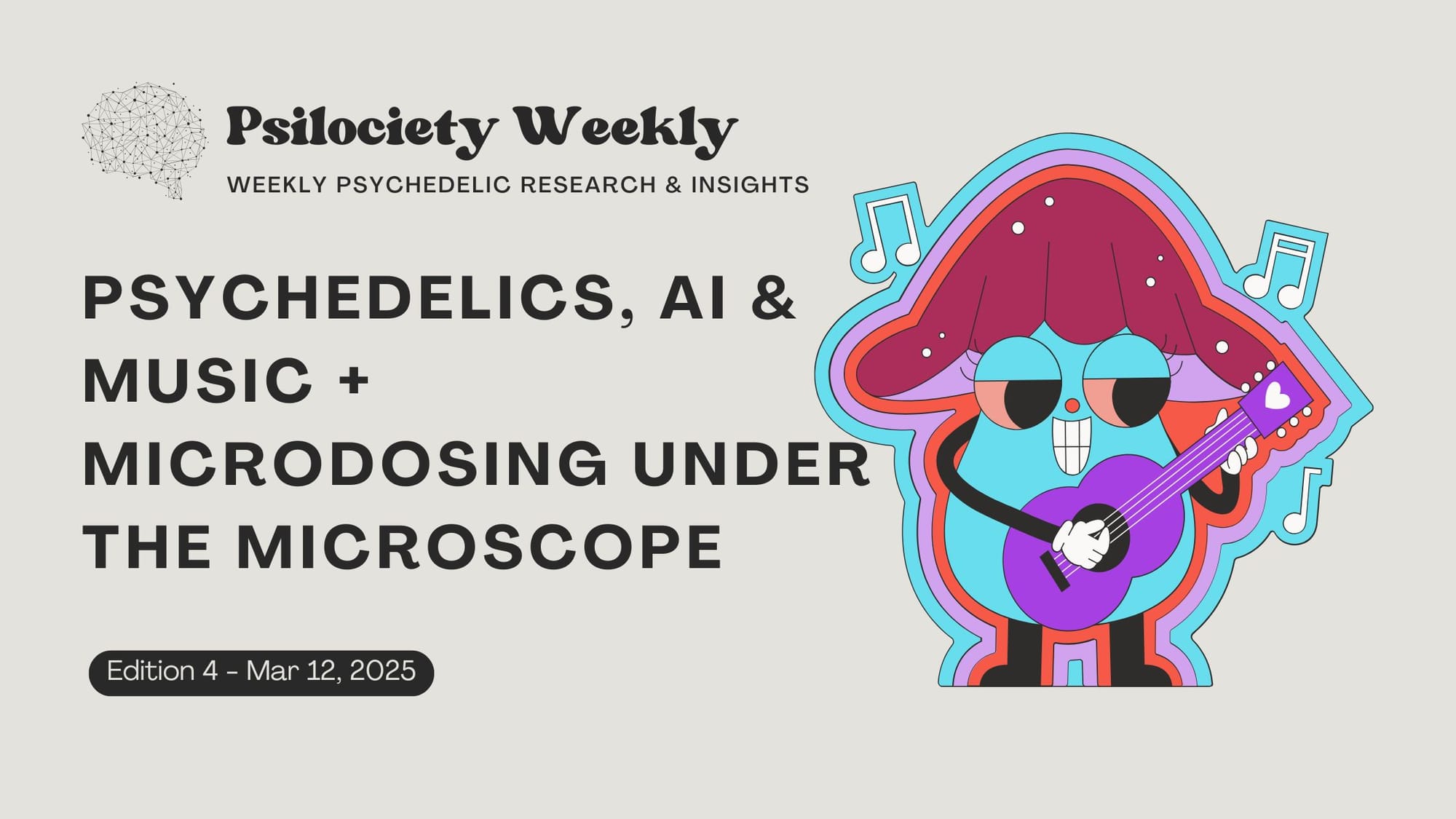Psychedelics, AI & Music + Microdosing Under the Microscope
The latest breakthroughs in psychedelic research, from AI-driven drug discovery to the role of music in psychedelic therapy. Explore new clinical trials, expert insights, and policy updates shaping the future of psychedelics for mental health & addiction.

🧠 This Week in Psychedelic Science
The latest from psychedelic research:
- RAADs, including ketamine, psilocybin, and novel agents, may offer promising alternatives for treating bipolar depression, but further research is needed to ensure efficacy and safety. Read full summary 👉
- Individuals in New Zealand are using psychedelics for self-treatment of mental health and wellbeing concerns, often in response to gaps in conventional healthcare access. Read full summary 👉
- AI-driven approaches, combined with psychedelic therapeutics and neuroplasticity research, could accelerate drug discovery and optimize personalized treatments for neurological and psychiatric disorders. Read full summary 👉
- Emerging research suggests that serotonergic psychedelics, such as LSD and psilocybin, may offer therapeutic benefits in reducing substance use and cravings in individuals with SUDs. Read full summary 👉
- Microdosing LSD and psilocybin is associated with mostly mild and transient side effects, including increased blood pressure, anxiety, cognitive impairment, and gastrointestinal discomfort. However, the risk of more severe side effects remains unclear due to study limitations. Read full summary 👉
🔬 Deep Dive: Featured Study of the Week
- Title: ‘Go with the "wave of music" to dive deep’: Exploring perceptions of psychedelic-assisted therapy and the role of music within this practice
- Published In: The Arts in Psychotherapy
- Key Finding: This study explores how music is perceived to shape the psychedelic therapy experience. Participants highlighted music’s role as both a guide and a "co-therapist," facilitating emotional release, peak experiences, and integration. However, concerns were raised about the potential for music to overwhelm or misalign with patient experiences.
- Why It Matters: The findings reinforce the critical role of music in psychedelic-assisted therapy, suggesting that personalized, intentional musical selection could enhance therapeutic outcomes. Understanding these perceptions can help refine best practices for integrating music into psychedelic-assisted psychotherapy.
- Read More: Read full summary 👉
🎙️ Expert Insights
“By harnessing the principles of receptor modulation, targeted delivery systems, and simplified AI integration, these breakthroughs promise transformative solutions for patient care and technological development.”
Dr. Robert B. Kargbo, ACS Medicinal Chemistry Letters (2025)
Why it matters
Dr. Kargbo emphasizes the synergy between psychedelic therapeutics and AI-driven drug discovery. His research suggests that machine learning algorithms can accelerate the identification of novel psychedelic compounds by predicting their binding affinity to specific serotonin receptors, optimizing their efficacy while minimizing side effects.
Additionally, targeted delivery systems—such as nanocarrier technologies—can ensure precise drug distribution in the brain, potentially reducing the risk of adverse psychological effects associated with psychedelics.
Dr. Kargbo's work envisions a future where AI not only streamlines drug discovery but also assists in personalized treatment plans for psychiatric conditions, using neuroimaging and patient-specific biomarkers to tailor psychedelic-assisted therapy.
🌎 Psychedelics in the News
- Oregon Cities Implement Psilocybin Bans: Despite Oregon's pioneering stance on therapeutic psilocybin, several cities have enacted bans due to rising public concern over drug liberalization and associated crises.
- Colorado's Psychedelic Therapy Program Launch: Colorado has finalized regulations for its psychedelic therapy program, with license applications opening by December 31. The program includes a four-step treatment model involving patient screening, facilitator matching, and psilocybin administration in controlled settings.
- Washington State's Psilocybin Legislation Stalls: In Washington, bills proposing regulated and supervised access to psilocybin for adults have failed to progress for the fourth consecutive year. Opposition from psychiatric and medical groups, as well as differing opinions among psychedelics advocates, have contributed to the legislative impasse.
- Illinois Considers Psilocybin Legalization: Illinois House Bill 1143, introduced by Representative La Shawn Ford, aims to decriminalize and tax psilocybin for residents aged 21 and older. The proposal underscores the potential mental health benefits of psilocybin, reflecting a growing interest in alternative therapeutic options within the state.
💡 Community & Resources
📚 Recommended Book - Radical Adventure: An Inquiry Into Psychedelic Psychotherapy By Andrew Feldmár: Explores Andrew Feldmár’s decades-long journey in psychedelic-assisted therapy, tracing his early experiences with LSD under the guidance of pioneers like R.D. Laing. Drawing from real patient stories, Feldmár emphasizes that the heart of psychedelic therapy lies not in the substances themselves, but in the deep therapeutic connection between patient and therapist.
🎙️ Podcast Recommendation - Can Psychedelics Heal Mental Trauma? Oprah Winfrey With Harvard Professor Michael Pollan: Oprah and Michael Pollan discuss the potential of psychedelic drugs like psilocybin and LSD in alleviating symptoms of PTSD, OCD, anxiety, addiction, and depression. The episode also features personal stories, including that of GoDaddy founder Bob Parsons, highlighting the transformative impact of psychedelics on mental well-being.
📆 Upcoming event - Psychedelic Therapeutics & Drug Development Conference May 19 to 20, 2025, in San Diego, CA, gathers leading researchers and industry leaders to discuss challenges and opportunities in developing psychedelics for health conditions with unmet needs. Topics include treatments for disorders such as PTSD, anxiety, depression, and opioid use disorder.
🔎 Research Spotlight: Open Calls & Clinical Trials
Opportunities to participate in psychedelic research.
United States
- Treatment Resistant Depression Clinical Trial – Recruiting Now: currently recruiting patients for a clinical trial in Treatment Resistant Depression in Salt Lake City, Utah.
- Computer Game, Qualitative, and MEG/EEG Assessment of Serotonergic Psychedelics: The goal of this observational study is to learn how the brain's information processing changes during and following administration of serotonergic psychedelics for people with and without mental illness receiving serotonergic psychedelics through any clinical trial at Yale University
- Psilocybin with Psychological Support for Military Veterans and First Responders with Co-occurring PTSD & Alcohol Use Disorder: This Phase 2 clinical trial tests the safety, efficacy, and lasting effects of psilocybin (25 mg) with psychological support for 40 military veterans and first responders (ages 18-65) with both alcohol use disorder and PTSD. It is a double-blind, placebo-controlled study with an open-label extension.
- Psilocybin Brain Stimulation and Imaging Pilot Study: This open-label pilot psilocybin administration study investigates the influence of psilocybin on brain function and cognitive control functions in clinically and psychiatrically healthy volunteers.
United Kingdom
- Psychedelics and couples: A scientific research project on the psychological effects of taking MDMA/psychedelic substances with your romantic partner.
- Psychedelic drug being tested as treatment for heavy drinking: UCL researchers are conducting the largest psychedelic brain imaging study to date, testing DMT as a treatment to reduce problematic alcohol consumption. Participants will receive an intravenous dose of DMT, a placebo, or active control drugs alongside brief psychological support, with follow-ups over nine months to assess long-term effects on drinking behavior and brain function.

